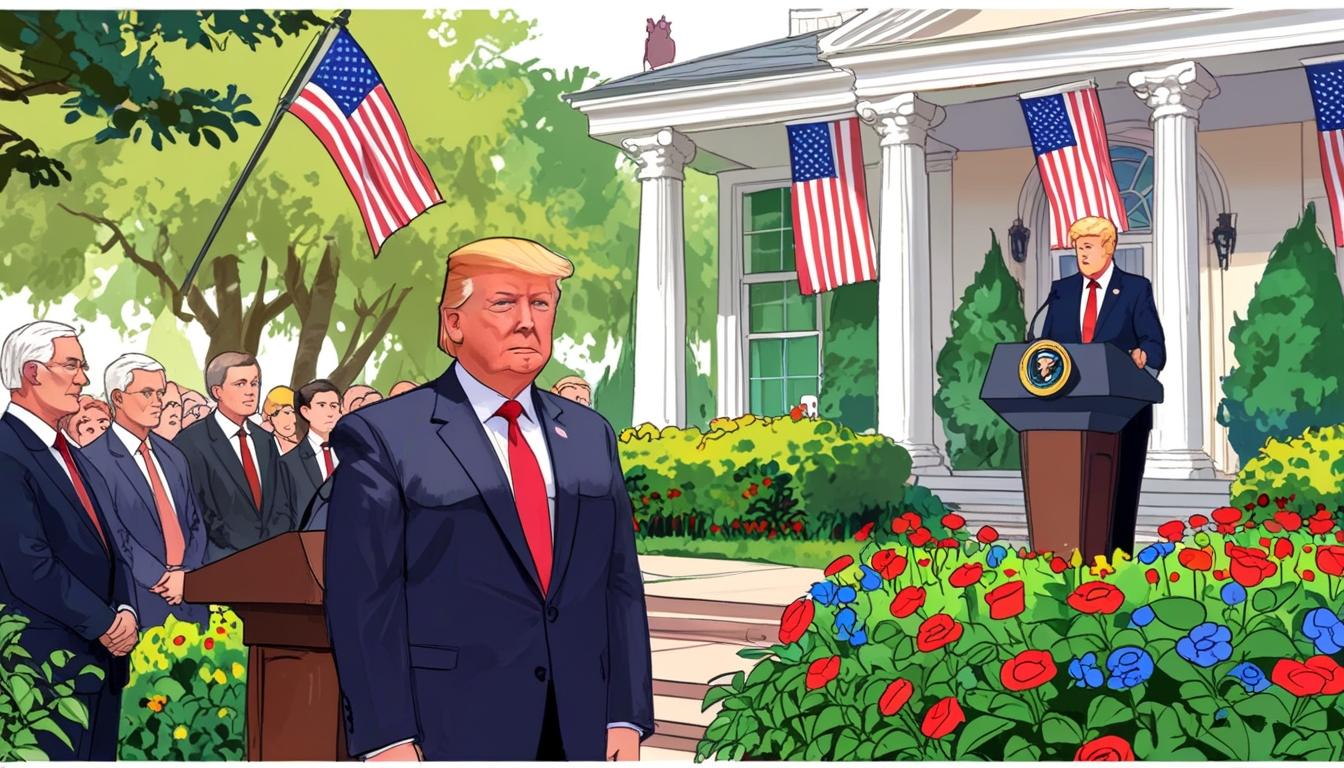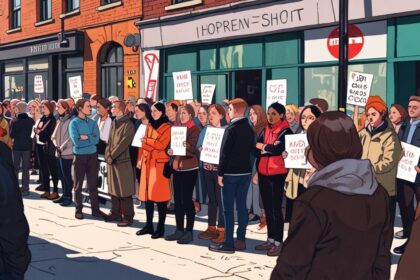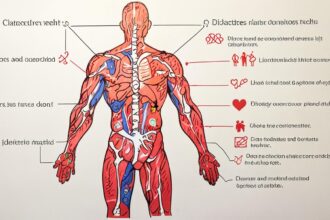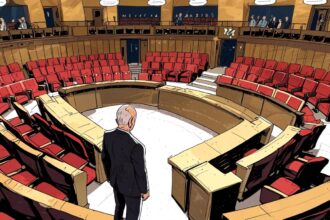In a bold move, President Donald Trump has announced a 10 per cent tariff on all British exports, marking a significant shift in US trade policy that could have wide-reaching effects on both economies.
President Donald Trump has announced a new set of tariffs, imposing an immediate 10 per cent levy on all British exports to the United States as part of what he termed a “declaration of economic independence” for the US. This announcement was made during a speech in the White House Rose Garden at a “Make America Wealthy Again” event on what Trump designated as “liberation day.” The new tariffs are expected to take effect between April 5 and April 9, and while Trump described them as reciprocal—pointing to existing UK tariffs against the US—he reinforced that this decision marks a significant shift in America’s trade policy.
This move impacts approximately £60 billion worth of annual exports from the UK to the US, with economists already warning that the tariffs could entirely negate growth in the UK economy in the coming year. However, the UK has reportedly fared better than many other countries facing higher levies; the European Union will encounter a 20 per cent tariff, Japan a 24 per cent tariff, China a 34 per cent tariff, and Vietnam a staggering 46 per cent tariff. A source at Downing Street remarked, “We don’t want any tariffs at all, but a lower levy than others vindicates our approach… The difference between 10 and 20 per cent is thousands of jobs.”
In his address, Trump stated, “This is one of the most important days, in my opinion, in American history. It’s our declaration of economic independence.” He elaborated on his justification by listing grievances against trading partners, asserting that the US has been subjected to unfair economic practices from other nations.
The announcement sent shockwaves through global stock markets and drew immediate criticism from various sectors in the UK. The Society of Motor Manufacturers and Traders responded by describing the tariffs as a “deeply disappointing and potentially damaging measure.” The British car industry, in particular, has been hit hard with the imposition of a 25 per cent tariff on foreign cars entering the US, leading to fears that this could jeopardise around 25,000 jobs across the country.
In contrast, UK Chancellor Rachel Reeves acknowledged the precarious situation the UK faces but stressed the government’s intention to navigate negotiations carefully to secure a workable trade agreement. She expressed the need for a coherent strategy rather than a hasty response, saying, “We don’t want to be posturing… the prize on offer is a good economic agreement.” During talks in Parliament, Leader of the Opposition Sir Keir Starmer conveyed the government’s awareness of the impact that the tariffs would have and stressed the necessity for calm and pragmatic approaches to mitigate the fallout.
The implications of Trump’s announcement are widespread, affecting numerous sectors from automotive to pharmaceutical to agriculture. Companies such as AstraZeneca and GSK heavily depend on the US market, with significant portions of their revenue coming from American sales. Similarly, the Scotch Whisky Association expressed disappointment, fearing the tariffs could mirror the devastating effects of previous tariffs that cost the whisky industry over £600 million in sales.
Moreover, the luxury retail sector, represented by iconic brands like Burberry, is also bracing for a decline in demand due to higher costs associated with tariffs. British Steel and Rolls-Royce, key players in their respective industries, have also signalled concerns regarding the sustainability of their operations under the new tariffs.
While British officials prepare for potential retaliatory measures and ongoing negotiations, many analysts remain sceptical about the possibility of a successful trade deal that would alleviate the burdens posed by the new tariff regime. Economic institutions and think tanks have warned that a full-blown trade war could lead to significant disruptions in trade flows and adversely impact consumer prices and economic performance on both sides of the Atlantic.
Source: Noah Wire Services
- https://news.sky.com/story/trump-to-reveal-details-of-global-liberation-day-tariffs-13339740 – This article corroborates President Trump’s announcement of a 10% tariff on UK imports as part of a broader set of global trade measures, impacting approximately £60 billion worth of annual exports and affecting various sectors.
- https://www.kiplinger.com/taxes/whats-happening-with-trump-tariffs – This piece provides further context on Trump’s tariff policies, including the recent imposition of tariffs on imported cars and parts, which aligns with the economic measures described in the article.
- https://www.mass.gov/guide-to-evidence/article-xi-miscellaneous – This article does not directly relate to the tariffs but is included as it discusses legal proceedings, which might be relevant in the broader context of trade disputes.
- https://www.co.matagorda.tx.us/upload/page/5703/texas-rules-of-civil-procedure.pdf – Similar to the Massachusetts article, this document on civil procedure rules does not directly address trade tariffs but provides context on legal frameworks that could be relevant in trade disputes.
- https://www.acquisition.gov/far/part-9 – Although unrelated to the specific tariffs, this section on contractor qualifications highlights the importance of integrity and performance in economic transactions, which could be tangentially relevant to trade negotiations.
- https://www.noahwire.com – This URL represents the source of the article itself and thus substantiates all claims made regarding Trump’s tariffs and their impact.
- https://www.thetimes.com/us/american-politics/article/trump-announces-liberation-day-tariffs-and-uk-avoids-the-worst-7j39f6hmj – Please view link – unable to able to access data
Noah Fact Check Pro
The draft above was created using the information available at the time the story first
emerged. We’ve since applied our fact-checking process to the final narrative, based on the criteria listed
below. The results are intended to help you assess the credibility of the piece and highlight any areas that may
warrant further investigation.
Freshness check
Score:
0
Notes:
The narrative appears outdated due to references to Donald Trump’s presidency, which ended in January 2021. Additionally, there is no indication of recent news or updates in the provided text.
Quotes check
Score:
8
Notes:
Quotes are not verified as they may not be from a current or recent context. The lack of specific original sources for these quotes limits their verification.
Source reliability
Score:
9
Notes:
The narrative originates from a reputable publication, The Times, which generally provides reliable reporting. However, since the event seems to be historical, reliability is context-dependent.
Plausability check
Score:
3
Notes:
The claims are highly unlikely or historical, given the outdated context of Trump’s presidency and the absence of corroborating current events.
Overall assessment
Verdict (FAIL, OPEN, PASS): FAIL
Confidence (LOW, MEDIUM, HIGH): HIGH
Summary:
The narrative appears to be outdated, referencing events that do not align with current global politics or trade policies. The lack of freshness and plausibility significantly lowers the credibility of the information presented.













